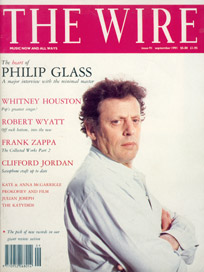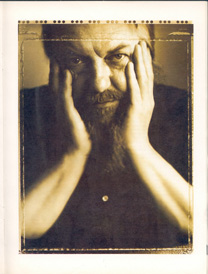| |
|
|
 There's
a Wyatt going on - The Wire Issue 91 - September 1991 There's
a Wyatt going on - The Wire Issue 91 - September 1991
|

|
THERE'S A WYATT
GOING ON
Robert Wyatt, that is. The art-rock artisan
of Soft Machine and Rock Bottom is back with
a brand-new record. Ben Watson meets the unmatched
mole of subversive pop. Photo by Michael Heffernan.
Robert Wyatt 's muse is back on-line. His new release, Dondestan,
is a telling and sensual as anything he has produced over
the last three decades. After a series of politically-oriented-projects
- the SWAPO benefit with Jerry Dammers, "Winds Of Change",
Elvis Costello's "Shipbuilding" - he has returned
to the music he "hears in his head", a strange
but effective mix of multitracked vocals and electric keyboards.
Drummer in The Soft Machine (the band, that, along with
Pink Floyd, epitomised late-60s underground rock in London),
Wyatt's second band Matching Mole was scuppered in 1973
by a fall that broke his back. Paraplegic and wheelchair
bound, he had to do a musical rethink: jazz and rock drummers
require legs. He found his voice could be an instrument.
In 1974 he released Rock Bottom, a masterpiece which
many interpreted as a commentary on his condition. Such
biographical interpretations are limiting. Being unable
to stir up bass drum and hi-hat bombast may explain its
calm, but the music was also an excellent critique of the
techno-pomp that progressive rock had become. Its domestic
quietism showed up commercialized virtuosity (Yes, ELP,
Genesis, Chick Corea) as effectively as the garage virtues
of punk did three years later. It had the haunting stillness
of Claude Debussy or Marvin Gaye: power through poignancy.
Dondestan does it again. How come?
"I got more into Dondestan than anything since
Rock Bottom. The organ I used on Rock Bottom
is called a Riviera. Alfie got it for us, it cost about
ten bob in an Italian toy shop. It's a three or four-octave
toy organ and I broke it in the late-70s and I thought,
that's it - it's symbolic. But since coming here to Lincolnshire,
Alfie said, Why don't you get it mended, and I've got it
mended. It's one of the reasons I was able to pick up from
Rock Bottom. You will hear the same sounds - it's
exactly the same organ and they don't make it anymore.
It was not just the Riviera. Wyatt has a healthy horror
of "setting texts", aware of the proper gel between
word and note that characterizes authentic song. A Kip Hanrahan
project on Paul Haines (lyricist for Escalator Over The
Hill) led to a track he was pleased with. The project
remains unreleased - unfortunate, because the other contributions
(by, among others, Roswell Rudd, Evan Parker and Derek Bailey)
sound intriguing too - but Wyatt learned that other people's
texts could be a stimulus.
Robert Wyatt's partner, Alfreda Benge, had written a book
of poems called Out Of Season when they were both
wintering in Catalonia in the mid-80s.
"When you become very familiar with something, it becomes
songlike in the head. I can't make a rule, but that's how
it happened. The poems were not written to be sung and therefore
they hadn't got the structures I fall into."
"The Sight Of The Wind" conveys what Wyatt calls
"a sense of the unfixableness of things". Robert
used a characteristically eccentric device.
"I used heavy breathing as a rhythm track which I haven't
done since Rock Bottom, because you just get a dip
and a rise rather than a punched-out beat. It was in seven,
so it wouldn't settle."
Wyatt is quick to dissociate himself from the fusion groups
who play in 7/4 in order to be "more complex".
"I'm not one for fancy time signatures - if you get
too clever with time signatures it sounds like the Newsnight theme - but sometimes you do want an unbalanced shift. You
can do anything in 4/4, look at Monk. 4/4 isn't just 4/4
anyway, it's 12/8. All any complex time signature really
is, is binary, either twos or ones in various combinations
- so no complex time signature is any more complex than
a simple one."
There is a wonderful section in "Left On Man"
where Wyatt choruses "oversimplify, reduce, oversimplify".
This guying of the conventional refutation of Marxism sounds
for all the world like Marvin Gaye singing "dance with
me baby" on I Want You.
"Marvin Gaye is very close to my heart.
There's something translucent about his textures, it's like
a sea with various layers and undertones. But actually that
comes off Groupa Irakere. They have this Cuban thing where
a couple of blokes put down their instruments and do a chorus
thing [sings and taps a clave rhythm]. I thought, it's so
nice when they do that, why aren't I a group, why can't
I put down my trumpets and trombones and do that as well?"
"Lisp Service" is a reply to Billy Joel's apology
for US foreign policy, whose video appeased (supposedly)
longforgotten wars by combining every famous image of American
military atrocity - Hiroshima, napalm fire, summary execution
- with a chorus that blithely claimed "We didn't
start the fire/It's been burning since the world began".
"'We Didn't Start The Fire' worried me, I thought,
Oh you smug git - yes you fucking did! If you're talking
about 'we' I can talk about 'you'. I don't often listen
to words, but he was saying, Listen to me, I've got something
serious to say, and I thought - you'd better have!"
Hugh Hopper's rousing melody gives "Lisp Service"
an eruptive force after the dreamy chant that precedes it.
Wyatt's own tunes have startling intervals and pungent harmonies
lacking in most pop music. Born in 1945, you might expect
him to be a blues boomer. Actually it has always been jazz
that fired him, ever since his father led him onto Fats
Waller. He hears differently.
"My father used to play Shostakovitch, Hindemith, Bartok,
and my mother played Monteverdi. I didn't hear much rock'n'roll
and I never liked it. My dad introduced me to jazz, I think
he'd seen Stormy Weather as a younger man. I thought
it was so wonderful that it took over my ears completely.
My dad got quite alarmed because I stopped playing the Bartok.
That was it really, I was in love and I've remained so."
Just now, as Natalie Cole's revival of "Unforgettable"
is bringing a startling shot of harmonic surprise to the
charts - King Cole's piano intro suddenly unleashing chords
synthipop producers have all forgotten - it is interesting
to hear Wyatt point out a different direction to blues,
rock and the pop norms of the 90s.
"I think maybe, being brought up on Hindemith and so
on, I just wanted that bit extra out of the chords, the
harmonies. When I did like singers it would be where there
would be harmonic stuff going on which you don't get on
a blues record - Ray Charles is so sophisticated harmonically.
That I could really deal with - it was the keyboard end
rather the guitar end."
Robert listens hard to music as music: his observations
have a spark lacking in either academic received wisdom
or self-serving biztalk. The disinterest in guitar, for
example, did not preclude appreciation of Jimi Hendrix,
whom the Soft Machine supported for a year: "so beautiful
every bloody time".
Wyatt is remarkably successful in using "world-music"
aspects - Kurdish lilts and Ouspecki rhythms litter Dondestan,
but he feels that any jazz enthusiast is already well prepared.
"It's like clothes - they have to fit. I don't have
a sense of the exotic. If you are a jazz fan you're used
to having people whose ancestors were African in your room,
so the whole concept of 'world music' doesn't mean that
much to you anyway."
His new enthusiasm is rap (a musical development that has
turned people ten years his junior into nostalgia freaks).
"When you speak words it's atonal music and drumming
is mostly atonal. Rap is very liberating, just getting the
rhythms and rhymes - that's where the music is, not in the
notes. It means that apart from the bass line, which can
be quite conventional, the stuff they can do - the little
textures and fiddly bits around the edge and the noises
they are making - where is that coming from? How did they
get that in there? How did they get so much in there?
How do they get so much in there clearly between
those two beats? Stunning stuff!"
New enthusiasms aside, he keeps returning to bebop.
"It's like cubism - obstinately unyielding and compressed,
not what they call user-friendly. Or like pemmican,
concentrated food Arctic explorers are. A taste of that
and anything else is flaccid. I can see, outside it, the
architecture isn't inviting, the space doesn't seem to be
there to sit down and make yourself comfortable - but once
you learn your way around in there it's utterly addictive."
When he talks about his upbringing, Wyatt's voice grows
quiet, and it is important to remember the battles of his
generation, a period when all black music was dismissed
as trivial entertainment, to be patronised by those who
knew classical music. His manner is so disarmingly unpretentious,
that it was only when transcribing his words that I realized
quite how angry they were.
"If you sing in a choir at school... we did Schubert,
so I remember a bit about him. We were told how to sing
vowels. We were told that the trouble with English was these
short vowels - we can't sing them, you can't hold a note
on them, so for the following vowels this is how to sing
them, you've got to break them down: 'ow' goes 'aa-ooo'
and you have to decide when to go from 'aa' to 'ooo'; 'i'
goes 'aa-eee'; and if you think how posh singers sing, they
sing 'through the naa-eet [night]' because they never sing
'i'. Which means that you get this really churchy mannerism
that only has one connotation. If I'd been stuck in legitimate
singing... I'm really grateful to all the musics we've been
discussing for not being bound by rules like that."
| |
selected discography
The Soft Machine - The Soft Machine (Probe)
1968
The Soft Machine - Volume Two (Probe SPB1002)
1969
The Soft Machine - Third (CBS66246) 1970
The Soft Machine - 4 (CBS 64280) 1970
The Soft Machine - Triple Echo (Harvest SHTW800)
triple 1967-76
Robert Wyatt - End Of An Ear (CBS) 1971
Robert Wyatt - Matching Mole (CBS)
Robert Wyatt - Little Red Record (CBS 65260)
1972
Robert Wyatt - I'm a Believer (Virgin VS114)
7" 1974
Robert Wyatt - Rock Bottom (Virgin V2017)
1974
Robert Wyatt - Ruth Is Stranger Than Richard
(Virgin V2034)
Jan Steele/John Cage - Voices And Instruments
(Island/Obscure 5) 1976
Robert Wyatt - Animal Film Soundtrack (Rough
Trade ROUGH40) 1981
Robert Wyatt - Nothing Can Stop Us (Rough
Trade ROUGH35) 1980-2
Robert Wyatt - Shipbuilding (Rough Trade
RTT115) 12" 1982
Robert Wyatt - Work In Progress (Rough Trade
RTT149) EP 1984
Robert Wyatt - The Age Of Self (TUC) 7"
1985
Robert Wyatt/SWAPO Singers - The Wind Of Change
(Rough Trade RTT168) 12" 1985
Robert Wyatt - Old Rotten Hat (Rough Trade
ROUGH69) 1985
Robert Wyatt - Dondestan (Rough Trade) 1991
|
|
|


